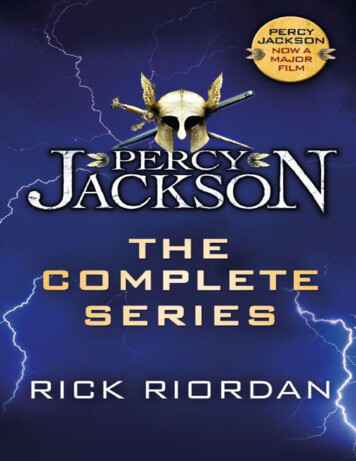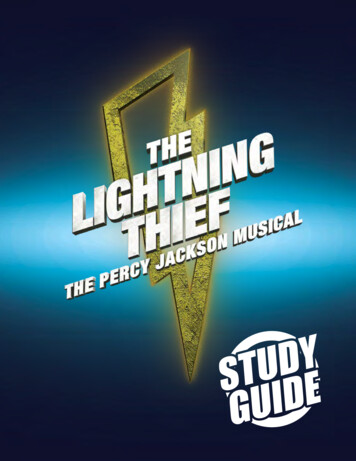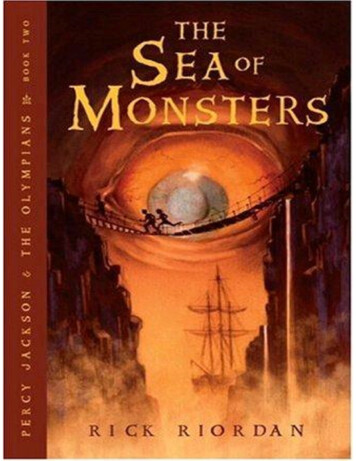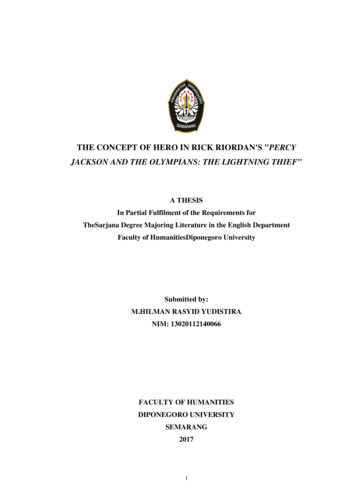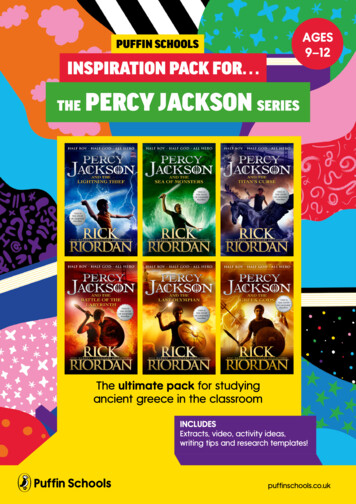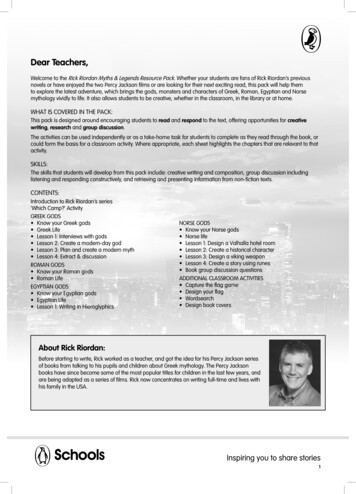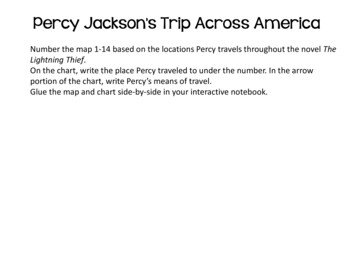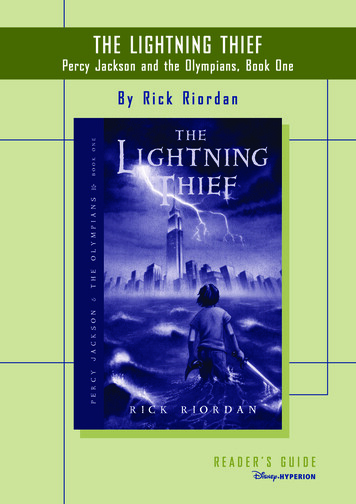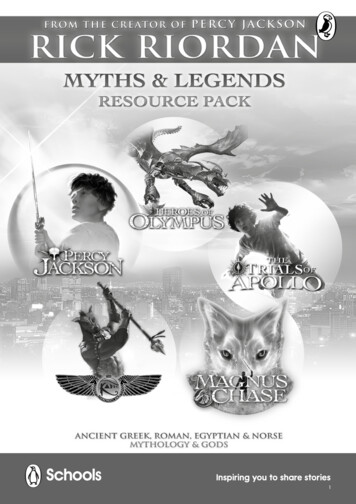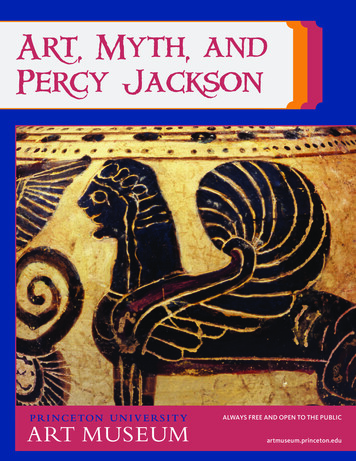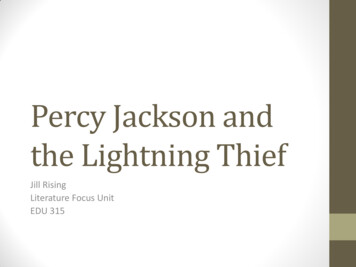
Transcription
Percy Jackson andthe Lightning ThiefJill RisingLiterature Focus UnitEDU 315
Literature SelectionFiction: Percy Jackson and the Lightning Thief by Rick Riordan The Seven Labors of Jack by Tracey West Harry And Hortense At Hormone High by Paul Zindel It’s All Greek to Me by Jon Scieszka The Trojan Horse: How the Greeks Won the War by Emily Little Aphrodite the Beauty by Joan Holub and Suzanne Williams The Demigod Diaries (The Heroes of Olympus) by Rick RiordanNonfiction D'Aulaires' Book of Greek Myths by by Ingri d'Aulaire and Edgar Parin d'Aulaire Greek Myths (DK Readers Level 3 Series) by Deborah Lock and Caryn Jenner She's All That!: A Look-It-Up Guide to the Goddesses of Mythology by Megan Bryant Oh My Gods!: A Look-It-Up Guide to the Gods of Mythology by Megan Bryant Lightning (Nature in Action) by Stephen Kramer Lightning (What on Earth?) by Brian Williams How Ben Franklin Stole the Lightning by Rosalyn Schanzer Nature Activities Weather Watcher by John Woodward A True Book: Experiments with Weather by Salvatore Tocci
Theme Study Students will take part in a thematic uniton Percy Jackson and the Lightening Thief.This unit will integrate reading and writingwith social studies, science, mathematics,art, music, and physical education. Students will develop an understanding ofGreek mythology, Greek gods andgoddesses and how natural phenomenasuch as thunder, lightning, and weatherwere explained in nonscientific terms.
Language Arts: Reading Activities Students will become “Lightning Readers” and read various fictionand non-fiction books. poetry and Greek Mythology through silentreading, partner reading, guided reading, reading aloud, andreader’s theatre. Students will read their Camp Half Blood stories and Greek GodMythology Haiku poems. Students will share their weather journals. Students will each read from Percy Jackson and the Lightning Thiefby Rick Riordan. Teacher will read aloud from D’Aulaiers’ Book of Greek Myths byIngri and Edgar Parin D’Aulaiers about a new God that is from PercyJackson and the Lightning Thief by Rick Riordan every day. Students will share personal entries about what they know aboutGreek Gods on the class chart of who’s who.
Language Arts: Writing Activities Students will write entries in a double entry journal as they read Percy Jackson and theLightening Thief by Rick Riordan about how they can relate to different quotationsthroughout the book. Students will write a story about if they were a Half-Blood, who their parents would be,what would their special abilities be, and why. Students will write an obituary for Medusa. They will include facts about her life and death,where people can send flowers and view her body. Students will write personal reflections on the good and bad things about thunderstormson the class chart. Students will write a haiku poem about Greek Gods and a concrete poem about Lightning. Students will add weather words to the Greek Word Wall. Students will write lyrics to a song about thunderstorms. Students will record the weather and types of clouds every morning in their weatherjournal. Students will create and write on a KWL chart about Greek Mythology. Students will write about a personal narrative about a thunderstorm. Students will write a story about “If I were a Greek God ” Students will be able to identify Greek and Latin roots of the word and be able to identifythem in other words.
Language Arts: Speaking Activities Students will join in a grand conversation about what they likeor dislike about thunderstorms. Students will take turns as the weather person to relate thedaily forecast. The students will use the author’s chair to read their storiesand poems to the class. Students will participate in a literature discussion circleconversing about Percy Jackson and the Lightning Thief byRick Riordan. Students will participate in a reader’s theatre, teaching theclass about their assigned God or Goddess. Students will share their KWL charts about Greek Mythology. Students will play the game, “Sparkle”, using the Greek WordWall words.
Language Arts: Listening Activities Students will listen respectfully to their peers as they sharetheir stories, poems, and journal entries. Students will listen to their peers’ opinions during grandconversations. Students will listen to Ancient Greek Songs. Students will listen to the sounds of a thunder storm. Students will listen to the teacher during Greek gods andgoddesses introduction time. Students will listen as the teacher discusses thunderstormsand lightning and how/why they happen scientifically.
Language Arts: Viewing Activities Students will take a virtual online tour of the Greek art -art Students will watch thunderstorm and lightning videos (SeeTechnology Ideas) Students will examine photographs of lightning and cloudformations. Students will enjoy the art work by their peers such aslightning bolts and Greek God Haiku Poems. Students will visualize the spellings of the words on the GreekWord Wall. Students will examine the class’s KWL chart.
Language Arts: Visually RepresentingActivities Students will display their Haiku poems in an artisticpresentation by illustrating their chosen god or goddesses. Students will create their own lightening bolt using tag board,makers, and glitter. Students will find words for the Greek Word Wall. Students will write and illustrate an ad for Crusty’s WaterbedPalace. Students will study lightning with electricity experiment (SeeScience). Students will explore static electricity with balloons (SeeScience). Students will experiment with making clouds (See Science). Students will create together a chart that represents ancientGreek Gods and the weather elements they controlled.
Science Activities Students will learn about the types of clouds that bring weather events. Theywill use the websites: http://www.scholastic.com/kids/weather/ onment/naturaldisasters/lightning-interactive/ to learn about weather and lightning. Students will identify, classify, and record the clouds every morning by using thebook The Weather Identification Handbook by Storm Dunlap. Students will investigate the causes and effects of lightning and thunderstorms. Students will research how meteorologists predict the weather. Students will create a Venn diagram by comparing thunderstorms tosnowstorms. Students will perform an experiment demonstrating electricity and lightningfrom the book Nature Activities Weather Watcher by John Woodward. Students will explore static electricity with balloons in the classroom. Students will perform “Experiment 8, Making Clouds” from the book A TrueBook: Experiments with Weather by Salvatore Tocci. Students will discuss safety tips and advice for Thunderstorms. Students will compare and contrast myths of thunder and lightning with modernscientific knowledge.
Mathematics Activities Students will graph the daily temperatures and the dailymoisture amounts, as well as daily wind speeds. Students will take a survey on who likes/dislikesthunderstorms and will graph the results. Students will solve word problems containing characters fromPercy Jackson and the Lightening Thief by Rick Riordan Students will use the dimensions of Ancient Greek structuresto find the area and perimeter of them. Students will convert and learn about Greek currency.
Social Studies Activities Students will complete a KWL chart about Greek Mythology Students can dress in tunics. Students will identify ancient Greece on a map and identify major citiesand structures. Students will identify the different gods and goddesses in GreekMythology. Students will study the Greek World View Map and compare it to a realmap of the world. Students will identify ways Greek mythology has transferred and isrepresented in today’s world in advertising. Each student will be assigned a Greek God or Goddess and will act outand teach the class about their God. Students will research and learn how geography affected Ancient Greeklife. Students will be given time to play and use interactive online games onwebsites such ive/arcade.htm andhttp://teacher.scholastic.com/activities/athens games/game.htm
Music and Art Activities Students will display their Haiku poems in an artistic presentation byillustrating their chosen God or Goddesses. Students will create their own lightening bolt using tag board,makers, and glitter. Students can each create their own shield, using tag board, markers,and scissors. Students will create a Weather Word Wall. Students will write and illustrate an ad for Crusty’s Waterbed Palace. Students will listen to Ancient Greek Songs from the CD “AncientGreek Music” by Atrium Musicae de Madrid & Gregorio Paniagua,which can be found on iTunes. Students will write and sing songs about Thunderstorms. Students will perform a “rain shower” on their desks using theirhands softer and louder in the sequence of a real thunderstorm. Students will listen to Thunderstorm sounds on the CD found oniTunes named “Storms, Weather, Thunder, and Lightning SoundEffects.”
Physical Education Activities Students will host the Olympics and participate by: Throwing plungers and frisbeesArm wrestlingThree-legged RaceWheel-barrow Race Students will participate in the basketball game “Lightning.” In thisgame, you need two basketballs. Everyone forms a line and willshoot free throws. If the second person in line makes the free throwbefore the first, they are out of the game. If the first person in linemakes it before the second person, they go to the back of the lineand the game keeps going until there is only one person left. Students will participate in the game “Capture the Flag” like in thebook Percy Jackson and the Lightning Thief by Rick Riordan.
Technology rt ent/naturaldisasters/lightning-interactive/ http://www.scholastic.com/kids/weather/ /arcade.htm www.mythweb.com cles.html www.theoi.com www.wingedsandals.com CD found on iTunes named “Storms, Weather, Thunder, andLightning Sound Effects.” CD “Ancient Greek Music” by Atrium Musicae de Madrid & GregorioPaniagua, which can be found on iTunes.
Language Arts Strategies Activating background knowledge: students will think about whatthey already know about thunderstorms and Greek Mythology. Brainstorming: students will think of many ideas related tothunderstorms and Greek Mythology through writing activities. Connecting: students will relate topics to the world around them byjournaling and creating a weather log and by role playing Greekgods. Predicting and Monitoring: Students will predict the daily weatherand keep track of weather patterns in a weather log. Playing with Language: Students will use language creatively throughstories, poems, and journals. Revising: Students will make changes to written activities. Visualizing: students will draw pictures in their minds.
Grouping Patterns Large group: grand conversations, wearing tunics, participatingin the Olympics, singing songs, capture the flag, viewingvideos, reader’s theatre, Venn diagram, and dailytemperatures and weather forecast. Small Group: Peer conferencing, small group discussions,creation of storm sounds, creating song lyrics, writing weatherreports, identification of Ancient Greece, identifying parts ofthe United States that receives thunderstorms, Individual: Writing stories, personal narratives, poems, letters,journal entries, making decorations and art projects,
Assessments Journal entries and KWL chart: Rubric Participation in grand conversations Analytical Writing Traits Rubrics and peer conferences for stories andpoems using a numerical score. Informal observation of author’s chair, reader’s theatre, sparkle, smallgroup work, and Olympic games. Venn diagrams and social studies maps: checklist Spelling test with words from Greek Word Wall If students can correctly perform and participate in science experiments:science lab reports- checklist Active participation in music performances. Portfolio of art work: Haiku backgrounds, lightning bolts, Thunder songs. Greek maps: accuracy assessment Performance and participation in Reader’s Theatre. Physical Education: Likert Scale Math problems and questions: accuracy scale.
MorningLanguageArtsMondayTuesdayWednesdayThursday Friday GrandConversationsRead Aloud:D'Aulaires' Bookof Greek MythsLightningReaders: PercyJackson and theLightning Thief. Read Aloud:D'Aulaires' Bookof Greek MythsWriter’sWorkshop: “If Iwere a HalfBlood.”Create GreekWord Wall View online ArtGalleryListen to AncientGreek Music “Rain shower” ondesksListen toThunderstormsoundsWriteThunderstormsongs Arm WrestlingTournamentRelay Races 3-legged RacesWheelbarrowRacesRecord & GraphDaily WeatherLightning ThiefWord Problems Record & GraphDaily WeatherConvert GreekCurrency Art/Music AfternoonP.E. Math Science SocialStudies Begin Olympics:Plungers &Frisbee ThrowingContest Graph Surveyaboutlikes/dislikes ofthunderstormsRecord & GraphDaily weather Begin cloudjournalsLearn aboutclouds usingonline interactivesitesVenn Diagram KWL MythologyChartStudy Map ofGreece and MarkMajor CitiesGreek WorldView Map Read Aloud:D'Aulaires' Book ofGreek MythsWriter’s Workshop:Greek MythologyHaikuCreate Artisticbackground forHaiku PoemsRead Aloud:D'Aulaires' Bookof Greek MythsWord Wall:SparkleLightningReaders: PercyJackson and theLightning Thief. Create anadvertisementfor Crusty’sWaterbed PalaceCreate lightningbolts Capture the flag LightningBasketball Record & GraphDaily WeatherFind the squarefootage anddimensions ofAncient GreekStructures Record & GraphDaily WeatherCompareweather fromDay to DayLightning ThiefWord Problems.Cloud journalsMaking CloudsExperiment Study howgeographyaffected AncientGreek Life.Interactive onlineGreek Games Cloud journalsStatic electricityexperiment withballoons Students willstudy how GreekMythology is inour World today.Study GreekCurrency Cloud journalsLightningExperiment fromNature ActivitiesWeatherWatcher Mark ancientstructures andbuildings onGreek Map.Study ancientGreek structuresand buildings. Read Aloud:D'Aulaires' Bookof Greek MythsAuthor’s Chair:Half-BloodStoriesLightningReaders: PercyJackson and theLightning ThiefArtist’s GalleryPerformThunderstormSongsCloud journals,share and discussThunderstormsafety advice anddiscussionDress in TunicsReader’sTheatre- GreekGods andGoddesses
State Standards- 4th GradeEnglish Language Arts 4.RL.2. - Determine a theme of a story, drama, or poem fromdetails in the text; summarize the text.4.RL.4. - Determine the meaning of words and phrases asthey are used in a text, including those that allude tosignificant characters found in mythology (e.g., Herculean).4.RL.9. - Compare and contrast the treatment of similarthemes and topics (e.g., opposition of good and evil) andpatterns of events (e.g., the quest) in stories, myths, andtraditional literature from different cultures.4.RI.3. - Explain events, procedures, ideas, or concepts in ahistorical, scientific, or technical text, including whathappened and why, based on specific information in thetext.4.W.3. - Write narratives* to develop real or imaginedexperiences or events using effective technique, descriptivedetails, and clear event sequences.4.SL.5. - Add audio recordings and visual displays topresentations when appropriate to enhance thedevelopment of main ideas or themes.Math Science Visual Arts 4.1.1 Students explore a wide range of visual art media* andmaterials, tools*, equipment, and technologies*.Physical Education 4.2.1 Apply basic offensive/defensive strategies (e.g.,marking and guarding, keep away) in pairs and small groups.4.3.2 Participate in moderate to vigorous physical activity(e.g., free play, play with peers, organized activity)4.OA.3.- Solve multistep word problems posed withwhole numbers and having wholenumber answersusing the four operations, including problems in whichremainders must be interpreted. Represent theseproblems using equations with a letter standing for theunknown quantity. Assess the reasonableness ofanswers using mental computation and estimationstrategies including rounding.4.5.1. Describe how as water condenses small dropletsof water form clouds and fog.4.5.5. Identify components of our solar system (e.g.,planets, moons, Sun)Social Studies 4.2.2 Use chronological terms (i.e., decade, century,generation)Music 4.9.1 Know music from various historical periods.4.9.2 Know how elements of music are used in musicexamples from various cultures.
Literature Selection Fiction: Percy Jackson and the Lightning Thief by Rick Riordan The Seven Labors of Jack by Tracey West Harry And Hortense At Hormone High by Paul Zindel It’s All Greek to Me by Jon Scieszka The Trojan Horse: How the Greeks Won the War by Emily Little Ap
